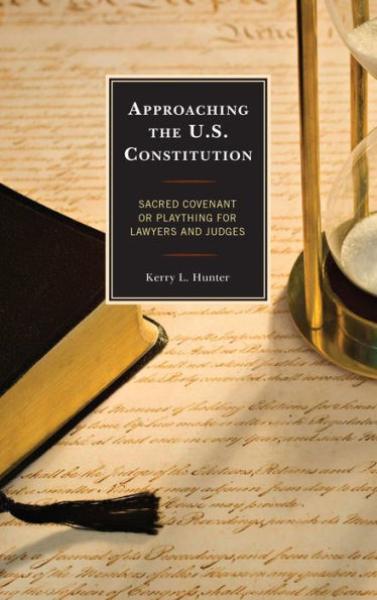Description
By reminding readers that early Supreme Court justices refused to reduce the Constitution to a mere legal document, Approaching the U.S. Constitution provides a definitive response to Reading Law by Antonin Scalia and Bryan Garner. Turning to the vision of Alexander Hamilton found in Federalists No. 78, Hunter argues that rather than seeing the judiciary as America's legal guardian, Hamilton looked to independent individuals of integrity on the judiciary to be the nation's collective conscience. For Hamilton, the judiciary's authority over the legislature does not derive from positive law but is extra-legal by 'design' and is purely moral. By emphasizing the legal expertise of judges alone, individuals such as Justice Scalia mistakenly demand that judges exercise no human ethical judgment whatsoever. Yet the more this happens, the more the "rule of law" is replaced by the rule of lawyers. Legal sophistry becomes the primary currency wherewith society's ethical and moral questions are resolved. Moreover, the alleged neutrality of legal analysis is deceptive with its claims of judicial modesty. It is not only undemocratic, it is dictatorial and highly elitist. Public debate over questions of fairness is replaced by an exclusive legalistic debate between lawyers over what is legal. The more Scalia and Garner realize their agenda, the more all appeals to what is moral will be effectively removed from political debate. 'Conservatives' lament the 'removing God from the classroom, ' by 'liberals, ' yet if the advocates of legalism get their way, God will be effectively removed from the polis altogether. The answer to preserving both separation of powers and the American commitment to unalienable human rights is to view the Supreme Court in the same way early founders such as Hamilton did and in the way President Abraham Lincoln urged. The Court's most important function in exercising the power of judicial review is to serve as the nation's conscience just as it did in Brown v. Board of Education.
This book argues that, given the political power the Supreme Court enjoys today, the answer to preserving the separation of powers, democracy, and the American commitment to unalienable human rights is to encourage the Court to intentionally serve as the nation's collective conscience, just as it did in Brown v. Board of Education.
America's litigious excesses may be inhibiting rather than advancing the cause of justice, argues Kerry Hunter. In an inventive new approach, Hunter grapples with the central question of how we conceive of our Constitution, and who, by rights, may lay claim to its interpretation. Drawing on the case of New Zealand, where courts lack judicial review, and infusing a fresh view of Alexander Hamilton, Hunter rightly warns us that legal sophistry is not only no substitute for, but may be inimical to, American justice.--Robert J. Spitzer, Distinguished Service Professor of Political Science, SUNY Cortland, Author, "Guns across America"
Professor Hunter has written an impassioned, original, and timely challenge to the legal sophistry and constitutional obsessions that are undermining U.S. politics. His argument is informed by a comparative cross-national perspective and long study of American legal practices. The result is a heady, provocative ethical defense of democratic ideals against narrow legalism and its corrosive effects on our polity.--Michael McCann, University of Washington
This book argues that, given the political power the Supreme Court enjoys today, the answer to preserving the separation of powers, democracy, and the American commitment to unalienable human rights is to encourage the Court to intentionally serve as the nation's collective conscience, just as it did in Brown v. Board of Education.
America's litigious excesses may be inhibiting rather than advancing the cause of justice, argues Kerry Hunter. In an inventive new approach, Hunter grapples with the central question of how we conceive of our Constitution, and who, by rights, may lay claim to its interpretation. Drawing on the case of New Zealand, where courts lack judicial review, and infusing a fresh view of Alexander Hamilton, Hunter rightly warns us that legal sophistry is not only no substitute for, but may be inimical to, American justice.--Robert J. Spitzer, Distinguished Service Professor of Political Science, SUNY Cortland, Author, "Guns across America"
Professor Hunter has written an impassioned, original, and timely challenge to the legal sophistry and constitutional obsessions that are undermining U.S. politics. His argument is informed by a comparative cross-national perspective and long study of American legal practices. The result is a heady, provocative ethical defense of democratic ideals against narrow legalism and its corrosive effects on our polity.--Michael McCann, University of Washington
Last updated on
Product Details
- Rowman & Littlefield Brand
- Apr 15, 2016 Pub Date:
- 0739197215 ISBN-10:
- 9780739197219 ISBN-13:
- 174 Pages
- 9 in * 6 in * 0.4 in Dimensions:
- 1 lb Weight:




